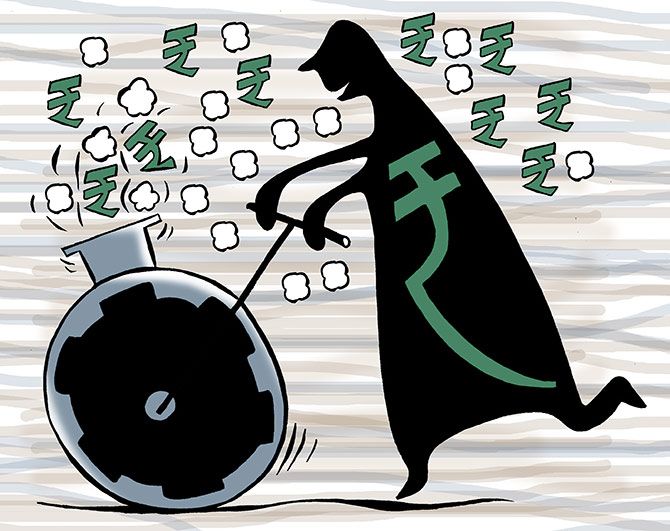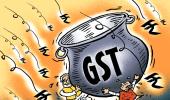A road map could be laid out for a gradual reduction in the tax rates from the current incidence of about 62-94 per cent without causing a major blow to the revenues of the Centre and the states. The opportunity arising out of higher GST collections should not be squandered, says A K Bhattacharya.
Illustration: Uttam Ghosh/Rediff.com

The May 2018 numbers for revenue under the Goods and Services Tax (GST) have raised concerns over a slowdown in collections.
Such fears, however, are unfounded. Drawing conclusions from a particular month’s collection figure coming in at less than Rs 1 trillion (the May 2018 number put it at Rs 0.94 trillion) is as flawed as judging revenue buoyancy without taking into account the factor of seasonality and the annual revenue target.
On both counts, the GST revenue numbers released last week show robust growth in tax collections.
Remember that these numbers pertain to the tax collections for April, the first month of the financial year.
The finance ministry’s data for the last five years shows that April revenues of excise and service tax have been the lowest, staying at just about 7 per cent of the full year’s collections. In contrast, the collections in March are as high as 11 per cent of the annual figure.
The April collections under the GST at Rs 0.94 trillion are of course lower than Rs 1 trillion in March 2018, but the decline is not as much as seen in the past few years in the same period.
Look at it another way, the April 2018 performance would look even more impressive. Total GST collections for the entire year of 2018-19 are budgeted at Rs 7.44 trillion.
Going by the seasonality of past tax collections, April 2018 should have fetched home only Rs 0.52 trillion or 7 per cent of the full year’s target.
But the actual collections at Rs 0.94 trillion are well over 12 per cent of the Budget estimate for the full year.
This growth is quite unusual - an outcome of wider coverage with a 53 per cent rise in the number of taxpayers under the GST regime and increased formalisation of the economy bringing more entities under the tax net.
This augurs well for the government’s fiscal consolidation plan, provided its other revenue streams such as divestment stay intact and there is no additional pressure on the expenditure side.
States, too, will benefit from such robust growth in GST collections.
Already, in their budgets for 2018-19, a majority of the states projected a sharp rise in their own tax revenue, thanks again to the GST.
At least 16 states have projected more than 50 per cent rise in their tax revenues in 2018-19.
The bigger takeaway from the GST revenue numbers released last week pertains to the amount of total compensation cess transferred to the states.
Compensation cess collected under the GST regime has to be shared with the states depending on their revenue losses.
For the whole of 2017-18, the Union government has shared Rs 0.48 trillion of compensation cess with the states.
This is only three-fourths of the total compensation cess collected in 2017-18.
Consider its implications for the GST regime and tax collections by the Centre and the states.
If this is the trend rate for collections of compensation cess, the government will be sitting on a sizeable amount of revenues collected from taxpayers as this amount will remain blocked in the GST Compensation Fund.
In 2018-19, the government hopes to collect Rs 0.9 trillion by way of compensation cess.
If only 75 per cent of this amount is claimed by the states (and this share may decline as states report higher revenue growth), the GST Compensation Fund will have accumulated a total unclaimed corpus of over Rs 1 trillion over a period of five years.
The GST regime stipulates that the compensation cess will be levied for a period of five years and the unclaimed amount will be sequestered in the Public Account.
The unclaimed amount will be shared equally between the Centre and the states after the compensation cess is withdrawn after five years.
So, what should the GST Council, which decides the rate structure, do under these circumstances?
One option could be to consider reducing the compensation cess rates.
At present, it levies the cess on over 50 items including aerated drinks, cigarettes, tobacco products and motor vehicles.
Now that it doesn’t need to collect so much revenue to compensate the states, why should the Council burden sectors such as soft drinks and motor vehicles in the name of compensating states at a time when their own revenues are growing rapidly?
Under the GST rules, states have to be compensated for the revenue losses claimed by them every alternate month. Thus, the status of claims would be known and settled fairly quickly, dispelling fears of claims arising later.
In any case, it doesn’t make sense to collect revenues and accumulate them in a fund to be shared after five years, which will create a sudden revenue flow for the states as well as the Centre. This will have adverse macroeconomic consequences that should be avoided.
The other option would be to recognise the buoyant revenue growth under the GST regime and speed up the process of lowering the 28 per cent duty slab to 18 per cent and raising the 5 per cent slab to, say, 12 per cent, barring some essential items.
Even the idea of bringing petrol and diesel under the GST regime could be examined by introducing a special tax rate for them.
A road map could be laid out for a gradual reduction in the tax rates from the current incidence of about 62-94 per cent without causing a major blow to the revenues of the Centre and the states.
In short, the opportunity arising out of higher GST collections should not be squandered.
Lower taxes for petrol and diesel under the GST will have a far-reaching positive impact on a wide range of industries using these fuels as inputs.
At the same time, a fiscal stimulus through duty cuts on various other items can boost consumption and growth. The question is for how long the GST Council will wait.












 © 2025
© 2025